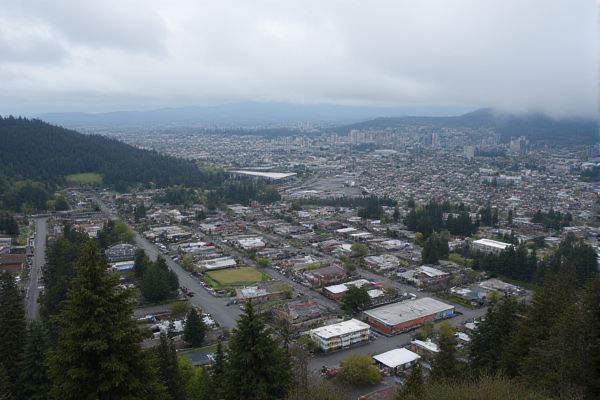
What to know as new resident in Oregon: Varied climate conditions throughout the state. Absence of a sales tax. Access to outdoor recreational activities. Strong environmental and sustainability focus. Local emphasis on coffee and craft beer. Bike-friendly cities and infrastructure. Farmer's markets and local produce availability. Cultural diversity within regions. Public transportation options in major cities. Tech industry presence in Portland.
Varied climate conditions throughout the state.
Oregon's climate is highly varied, with mild temperatures on the western side due to the Pacific Ocean's moderating effect, while the central and eastern regions experience a greater annual and diurnal temperature range and are much drier due to the Cascade Mountains blocking moisture. The state sees significant differences in precipitation, with heavy rainfall in the western slopes and drier conditions in the east. For more detailed insights on Oregon’s climatic variances, explore the Oregon Climate Summary.
Absence of a sales tax.
As a new resident in Oregon, you should know that the state has no general retail sales tax, meaning you will not pay sales tax on purchases made within the state, and Oregon businesses do not collect sales tax from Oregon residents. However, Oregon businesses may still need to collect and remit sales tax for sales made to customers in other states that have sales tax laws.
Access to outdoor recreational activities.
As a new resident in Oregon, you can enjoy a wide range of outdoor recreational activities in and around Portland, including hiking in Forest Park, walking in Laurelhurst Park, exploring the Hoyt Arboretum, and accessing ADA-compliant trails. You can also engage in activities like whitewater rafting, kayaking, and cycling along various trails and waterways. The state also offers numerous beginner-friendly outdoor activities, such as guided hikes, paddling trips, and mountain biking, making it easy to get involved in Outdoor Recreation.
Strong environmental and sustainability focus.
As a new resident in Oregon, you should know that cities like Portland are pioneers in environmental and sustainability initiatives, featuring smart growth strategies, extensive green roofs, innovative stormwater management systems, and strong land use planning to minimize sprawl and promote eco-friendly living. For more detailed information, you can visit their Urban Green-Blue Grids project site, which highlights these groundbreaking efforts in fostering a sustainable urban environment.
Local emphasis on coffee and craft beer.
In Oregon, particularly in Portland, there is a strong emphasis on both coffee and craft beer, with a vibrant "third-wave" coffee culture featuring over 200 specialty coffee shops and micro-roasters. This [Coffee Lover's Guide to Oregon](https://traveloregon.com/things-to-do/eat-drink/coffee-tea/coffee-lovers-guide-to-oregon/) highlights the dedication to exceptional coffee-making processes that prioritize quality, flavor, and sustainability. Additionally, the craft beer scene flourishes with over 70 breweries, known for their innovation, community involvement, and a focus on local, sustainable practices.
Bike-friendly cities and infrastructure.
Oregon, particularly Portland, is highly bike-friendly, boasting extensive infrastructure that includes miles of bikeways, protected bike lanes, greenways, and multi-use paths, as well as specialized bike traffic signals and transit systems that accommodate cyclists. The state ranks second in the nation for bike-friendliness, with policies and programs that promote safe and accessible cycling. For more detailed information, visit the Portland Bicycle Safety Overview to explore the city's commitment to supporting its cycling community.
Farmer's markets and local produce availability.
As a new resident in Oregon, you can find an abundance of local produce by exploring over 125 farmers' markets spread across the state. These markets offer a variety of seasonal fruits, vegetables, and other products, providing a taste of Oregon's rich agricultural bounty. Additionally, there are other resources such as CSA programs, farm stands, and specialty food markets that enhance your access to fresh, regional goods. To ensure you're enjoying the freshest produce, it's helpful to consult the Seasonality Chart, which lists the availability of various fruits, vegetables, and nuts throughout the year. This comprehensive guide allows you to savor the best of what's locally grown, any time of the year.
Cultural diversity within regions.
Oregon's cultural diversity is marked by its rich Native American heritage, with approximately 80 Native American tribes having lived in the state before European settlement, and seven federally recognized tribes with reservations today. The state has also seen increasing ethnic diversity since World War II, particularly with growth in African American, Asian, and Hispanic populations, although it remains less diverse than the national average. For more information, you can explore the extensive details on the Culture of Oregon on its dedicated page.
Public transportation options in major cities.
In Portland, Oregon, public transportation options include the TriMet bus system, MAX Light Rail with over 90 stations, and the Portland Streetcar with three lines, all offering frequent service and connectivity across the city and its suburbs, with accessible and bike-friendly features. For more information on planning your journey and understanding the comprehensive transportation network, visit the Travel Portland website for detailed guidance and resources.
Tech industry presence in Portland.
Portland is a thriving tech hub, ranked among the top 10 cities in the U.S. for tech jobs, with a highly educated workforce, a supportive business ecosystem, and major industry players like Intel, Apple, and Amazon. The region is known for its innovation in Software Development, including AI, machine learning, and cloud-based automation, and is home to successful startups like Vacasa and New Relic.
